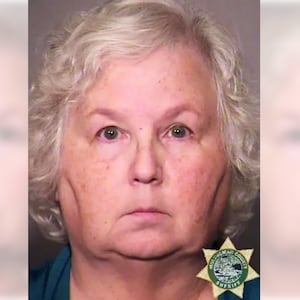It was a decent plan.
Buy a gun, but also buy a replacement slide and barrel for that gun, so that before she killed her husband, she could swap out the parts with an untraceable set purchased on eBay. Learn how to load it, to shoot it. Wait for a morning she knew he’d go to work early, before anyone else would be at the Oregon Culinary Institute, where no cameras could record the crime. Leave her phone at home. Stake out the scene, to be sure he’d made it in the building. Wait until he’d finished loading and unloading, when she knew he’d be deep inside the school building, focused on setting up for a cooking drill. Shoot him, once in the back and then again in the chest, finishing him off. Race back home again, before anyone spotted her. Wander the yard, frantic, making sure neighbors saw her at home, “looking for the dogs.” Hop on the computer and get some writing done. Play dumb when a friend called to report police activity at the school. Race back down to the scene of the crime, as if it were the first time she’d left the house that morning, answer some questions from detectives, and head home again.
That’s the State of Oregon’s theory about how the Oregon romance novelist Nancy Crampton Brophy conceived of a plot straight out of a suspense novel, but one that prosecutors charge that she carried out herself, in real life. Brophy, Deputy District Attorney Shawn Overstreet contended, wanted to be free of her chef husband and the ways their simple life and struggle to make ends meet held her back from the comfortable retirement in some faraway place—Portugal, perhaps—that killing Dan Brophy and collecting more than $1 million in life insurance policies would afford. This would-be writer who’d seven years earlier published an essay entitled “How to Murder Your Husband” had gone and done just that, he told jurors—albeit without mention of the essay itself, which was ruled inadmissible, too prejudicial. If Overstreet is right, Brophy answered in real life the rhetorical question she’d posed in that essay: “Divorce is expensive, and do you really want to split all your possessions?”
But, she warned “The police aren’t stupid. They are looking at you first. So you have to be organized, ruthless and very clever.”
Nancy Brophy wasn’t clever enough, Overstreet contended in closing arguments Monday on the 26th day of her murder trial. She failed to realize that in driving her minivan to and from the crime scene that morning, she’d be captured on a series of cameras scattered throughout Portland. She told detectives she’d stayed home all morning, when those cameras showed that she had not. She’d have to explain why a longtime hater of guns would amass a volume of internet search history that showed her researching “ghost guns” and “gun kits,” how to assemble and disassemble guns, and which kinds of guns had the worst blowback.
It was research for a story, she testified. Well, some of it was research for a story. The gun she bought at a gun show in December 2016, that was for protection. She forgot that she’d driven downtown the morning of the shooting, she offered. Must be some kind of memory problem. Maybe the trauma of learning her husband had been killed.
Nancy Brophy and her attorneys offered a range of explanations throughout the month-long trial for her behavior, both for the June 2017 day of Dan Brophy’s murder and the months that preceded it, explain away a pile of circumstantial evidence the state contends leaves no reasonable doubt about who killed the 62-year-old chef.
“She felt the need to get up and explain to you all these issues. The state put on a case, it looks really bad for her,” Overstreet said. “So she sat up there with the intent of manipulating all of you into believing her lies. She’s manipulating every person in this room, just like she has all of her friends, just like she has her family.”
To the defense, Nancy Brophy’s story made perfect sense, especially when you remember that this is a woman whose love for her husband never wavered, at least not that anyone saw. The couple’s finances had gotten a little rough, but they were on the rebound. The insurance policies were just smart planning. The memory lapses on the day of the murder were understandable, backed by neuroscience, even. A trauma like learning your husband has been murdered is enough to wipe the mind clean for a couple of hours.
The state didn’t meet its high burden of proof, Brophy attorney Kristin Winemiller argued. Prosecutors made claims at the trial’s opening that fell apart as the case went on. They exaggerated the size of the insurance payouts Brophy might receive if her husband died. They introduced a surprise witness, a convicted embezzler who supposedly told detectives Brophy had told her she was “this far apart” when the chef was shot, only for that witness to backpedal mightily when she finally took the stand. The detectives didn’t investigate other possibilities thoroughly enough, Winemiller said, failing to look deeply into suspicious characters found to be lurking around the culinary school on the morning of the murder. They even failed to examine the crime scene thoroughly enough; maybe there was liquor missing, and maybe that was the reason Dan Brophy was killed that morning.
“The love story of Dan and Nancy was told throughout the entire trial,” Winemiller said. “Nancy Brophy loved her husband. She loved that man. You could see that in her eyes every time she talked about him. Her eyes lit up. They absolutely twinkled when she could finally be in a courtroom talking about him. They sparkled. You heard a love story in this courtroom. They loved each other, right up to their very last day together. They were looking forward, so forward, to spending the rest of their lives together.”
Much of what Winemiller presented to the jury on Monday talked past much of the prosecutor’s closing argument, which was essentially this: Nancy Brophy was the only person who had the means, opportunity and weapon to carry out this crime. While Overstreet addressed the possible motive, because “motive is something that we as humans want,” he insisted motive isn’t a necessary component of the verdict, in this case. What matters, Overstreet said, is what we know about the morning of June 2, and the events leading up to Dan Brophy’s murder.
“Dan was executed on June 2. This wasn’t an accident, clearly. There was no struggle. There was no robbery. There was no interrupted burglary. Whoever went into the culinary institute in that short six-minute window went in there to kill Dan,” Overstreet said. “There’s no other way to view that. This happened at the exact same time Nancy Brophy was at the culinary institute, and using the exact same weapon and caliber that Nancy Brophy happened to own. It’s too much of a coincidence. There are too many coincidences. She knew everything about Dan’s routine. She knew everything about that school, down to the fact that they wouldn’t have cameras. She had the plan in place. She had the opportunity to carry out this murder. She also is the only person who had the motive.”
On Tuesday morning, after Overstreet offers a rebuttal to the defense’s closing, the case goes to the jury.








